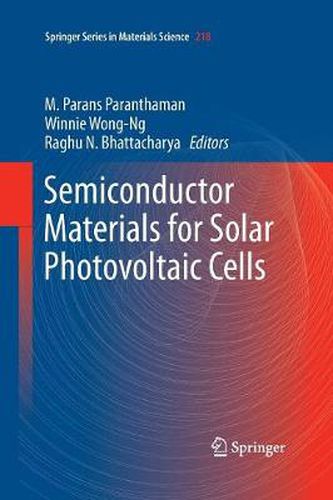Readings Newsletter
Become a Readings Member to make your shopping experience even easier.
Sign in or sign up for free!
You’re not far away from qualifying for FREE standard shipping within Australia
You’ve qualified for FREE standard shipping within Australia
The cart is loading…






This title is printed to order. This book may have been self-published. If so, we cannot guarantee the quality of the content. In the main most books will have gone through the editing process however some may not. We therefore suggest that you be aware of this before ordering this book. If in doubt check either the author or publisher’s details as we are unable to accept any returns unless they are faulty. Please contact us if you have any questions.
This book reviews the current status of semiconductor materials for conversion of sunlight to electricity, and highlights advances in both basic science and manufacturing. Photovoltaic (PV) solar electric technology will be a significant contributor to world energy supplies when reliable, efficient PV power products are manufactured in large volumes at low cost. Expert chapters cover the full range of semiconductor materials for solar-to-electricity conversion, from crystalline silicon and amorphous silicon to cadmium telluride, copper indium gallium sulfide selenides, dye sensitized solar cells, organic solar cells, and environmentally friendly copper zinc tin sulfide selenides. The latest methods for synthesis and characterization of solar cell materials are described, together with techniques for measuring solar cell efficiency.
Semiconductor Materials for Solar Photovoltaic Cells presents the current state of the art as well as key details about future strategies to increase the efficiency and reduce costs, with particular focus on how to reduce the gap between laboratory scale efficiency and commercial module efficiency. This book will aid materials scientists and engineers in identifying research priorities to fulfill energy needs, and will also enable researchers to understand novel semiconductor materials that are emerging in the solar market. This integrated approach also gives science and engineering students a sense of the excitement and relevance of materials science in the development of novel semiconductor materials.
*
Provides a comprehensive introduction to solar PV cell materials
*
Reviews current and future status of solar cells with respect to cost and efficiency
*
Covers the full range of solar cell materials, from silicon and thin films to dye sensitized and organic solar cells
*
Offers an in-depth account of the semiconductor material strategies and directions for further research
*
Features detailed tables on the world leaders in efficiency demonstrations
*
Edited by scientists with experience in both research and industry
$9.00 standard shipping within Australia
FREE standard shipping within Australia for orders over $100.00
Express & International shipping calculated at checkout
This title is printed to order. This book may have been self-published. If so, we cannot guarantee the quality of the content. In the main most books will have gone through the editing process however some may not. We therefore suggest that you be aware of this before ordering this book. If in doubt check either the author or publisher’s details as we are unable to accept any returns unless they are faulty. Please contact us if you have any questions.
This book reviews the current status of semiconductor materials for conversion of sunlight to electricity, and highlights advances in both basic science and manufacturing. Photovoltaic (PV) solar electric technology will be a significant contributor to world energy supplies when reliable, efficient PV power products are manufactured in large volumes at low cost. Expert chapters cover the full range of semiconductor materials for solar-to-electricity conversion, from crystalline silicon and amorphous silicon to cadmium telluride, copper indium gallium sulfide selenides, dye sensitized solar cells, organic solar cells, and environmentally friendly copper zinc tin sulfide selenides. The latest methods for synthesis and characterization of solar cell materials are described, together with techniques for measuring solar cell efficiency.
Semiconductor Materials for Solar Photovoltaic Cells presents the current state of the art as well as key details about future strategies to increase the efficiency and reduce costs, with particular focus on how to reduce the gap between laboratory scale efficiency and commercial module efficiency. This book will aid materials scientists and engineers in identifying research priorities to fulfill energy needs, and will also enable researchers to understand novel semiconductor materials that are emerging in the solar market. This integrated approach also gives science and engineering students a sense of the excitement and relevance of materials science in the development of novel semiconductor materials.
*
Provides a comprehensive introduction to solar PV cell materials
*
Reviews current and future status of solar cells with respect to cost and efficiency
*
Covers the full range of solar cell materials, from silicon and thin films to dye sensitized and organic solar cells
*
Offers an in-depth account of the semiconductor material strategies and directions for further research
*
Features detailed tables on the world leaders in efficiency demonstrations
*
Edited by scientists with experience in both research and industry